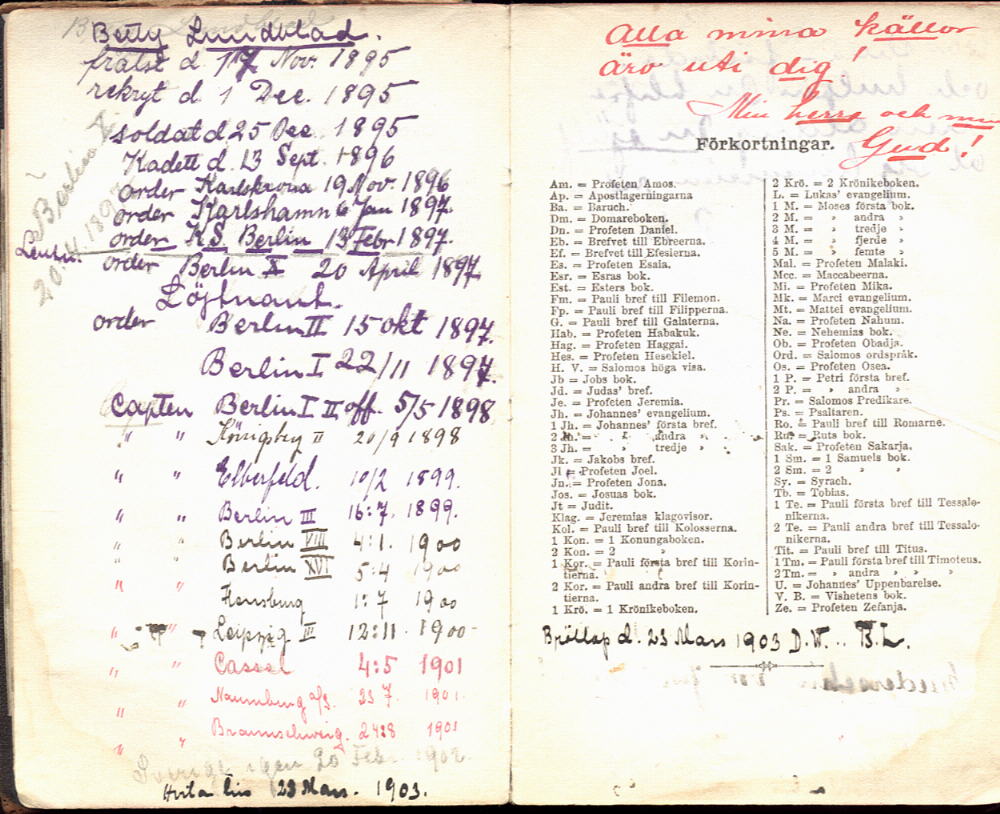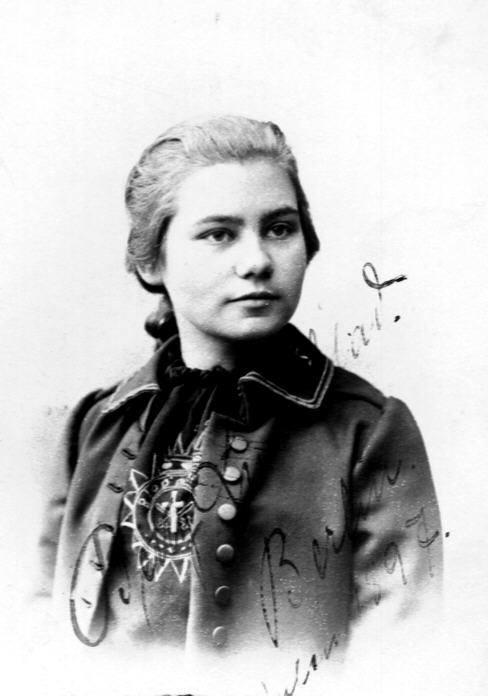 |
By General Erik Wickberg
In reality, my mother had several Bibles. During her long life she used Bibles in five languages, because as a Salvation Army officer she worked in five different countries. Besides her Swedish Bible she owned German, English, French and Danish versions.
But it is about her first Bible I want to write. It carries the inscription "Betty Lundblad, from mother, October 27, 1894." Underneath is a name of a small village in Sweden, "Dingtuna" and lastly the word "Faithful."
If memory serves me right, my mother at 17 was employed by a family in Dingtuna to assist the children with their school work. She studied German, English, and French in a girls' school, where she also took piano lessons. Now she was to teach the children of a railroad inspector how to read and also give them music instruction.
 |
 |
There are other annotations on one
of the flyleaves of this Bible that could be the nucleus for a complete
biography. These notations are all in my mother's own clear, beautiful
handwriting. First I read, "Betty Lundblad." Then, "Saved November 17,
1895." But if I look a bit more closely, perhaps the date is November 16.
This might be considered a trivial detail after all these years. But when
I recall the protracted "after meetings" the Army had in those days, it
could well be that the meeting in which mother was saved began on November
16 but that the decision, the personal encounter with God resulting in
salvation, didn't occur until after midnight. "Saved November 17."
(Picture from 1897) |
My maternal grandparents were warmly religious people, grandmother fanatically so. Grandfather was more quiet.
During a number of years grandmother was a soldier of the Gävle 1 Corps. Together with a business partner, grandpa moved with his family to Örnsköldsvik, where he founded a forge and machine shop. He felt most at home among the Swedish Covenant people in their services, but he showed hospitality towards The Salvation Army's leaders and helped build the first Army hall in Örnsköldsvik.
So it was not surprising that Betty Lundblad would become a Salvation Army soldier. The next notation reads: "Recruit, December 1, 1895." On Christmas day the same year she was enrolled as a soldier.
The young lassie from Norrland departed for training as a Salvation Army officer. This was no easy task. In those days it meant a real sacrifice, poverty and an uncertain future. For the manufacturer's daughter it might have been an especially difficult decision.
The officers' training lasted two months. Then we read: "Orders to Karlskrona, November 19, 1896." Still as a cadet came orders to move to Karlshamm on January 6, 1897. Then comes the great adventure: "Orders to training college, Berlin (Germany), February 13, 1897."
In retrospect it is easy to realize that this was one
of the turning points in mother's life. Much of what followed would never
have materialized if she had refused the appointment or if she had not
received the order.
The Salvation Army had begun work there in 1886. The beginning was rather difficult. The turning point came when an affluent industrialist from the Ruhr district, Jacob Junker, attached himself to the strange movement of British origin and thus gave it added stature quickly. He was fully dedicated to what he saw as a calling of God, and when he became chief secretary his business acumen, his natural gifts and good name were great assets.
Now more officers were needed to take hold of the great opportunities in Kaiser Wilhelm's vast empire. Some lassies from Britain were sent to Berlin, but the language barriers were formidable. None of them mastered German. Their testimonies were written on small pieces of paper, and often these notes were mixed up.
Then came the idea to ask Sweden for reinforcements. Mother
had studied German in school and had mastered the grammar perfectly, so
she was asked if she would go to Germany, and she said, "Yes." After two
months in the German training college, still a cadet, she received orders
to Berlin No. 1 Corps, located on Landsberger Strasse. She was promoted
to lieutenant on October 15, 1897, with orders to proceed to Berlin No.
2 Corps.
"Das Fräulein aus Schweden" (the miss from Sweden) was asked if polar bears roamed the streets of Stockholm, and would she read the label, printed in Swedish, on the match boxes. She did, and sold her Crys--a needful mission. The Salvation Army at that time had in Berlin at least 16 corps, but not one housed in its own building. Halls and quarters were rented, and the rent, by month or week, had to be paid in advance. And if the rent wasn't paid on the date due, immediate eviction resulted.
Sometimes some money came from home, and that called for a celebration. She baked Swedish "coffee bread" (pastry) and "sugar cake" (sponge cake). But more often the money was used to purchase shoes and clothes.
In the autumn of 1898 mother, as a newly promoted captain, received orders to travel to Königsberg in East Prussia to "open fire." Then followed command of 10 other corps, three of them in Berlin. The battles must have been hard, but not in vain.
She started off for the pawnshop. On the way it dawned on her that she owned still another watch, a more expensive one, a gift from her father. Was it right to pawn the cheaper watch? Wasn't she doing it for the Lord? Wasn't she in Berlin on His command?
So the captain from Sweden turned around, went home and fetched the gold watch. From this gold timepiece she got enough money to pay the rent.
The last time I was in Stockholm an old-time officer thrust a little card into my hand. I had never seen it before. I read:
"You are invited to attend our wedding in Karlskrona, Monday, March 23, 1903, 8:00 p.m. in The Salvation Army Hall. Betty Lundblad - D. Wickberg. R.S.V.P."
Thus a Swedish Salvation Army officer brought home his bride from Germany. Dad used to tell how he had become interested in the courageous young cadet, eight years his junior, who had received orders to Berlin and how his affections for her had deepened with the years. Mother's engagement ring bears the date 8-4-1900, her 23rd birthday--two and a half years before the wedding.
When mother returned to Sweden at the end of 1902, she was so tired due to hardships and strenuous efforts that she had to have a period of rest. She had lost so much weight and looked so pale that she was surprised that "David still wanted me as his bride." But David received a good and efficient helpmate.
And interpret him she did! Lectures, services, conversations, the "continual comrade in the salvation war" was much more so than he ever dreamed she would be at the marriage in Karlskrona. Never before had he depended on her to this extent. He soon mastered the language, although he never became too friendly with German grammar.
The service in Germany in 1912 was followed by three other appointments that necessitated knowledge of the German language. Dad was principal of the training college in Switzerland from 1922 to 1925, field secretary in Germany from 1925 to 1928 and territorial commander for Switzerland from 1933 to 1941. During these years he did not need an interpreter to transmit his sermons. He preached, conversed and sang without any difficulty in German. All these appointments came about because of his first two years' experience in Berlin. And he came to Germany because mother had served there previously. What if Cadet Betty Lundblad had refused her orders to Berlin in 1897?
Mother's other Bibles could also tell some wonderful happenings, too. But that is another story.
Translated from Swedish by Lt.-Colonel Edward Nelson Published
in the War Cry for May 8, 1971
Slightly edited 1998 by SW